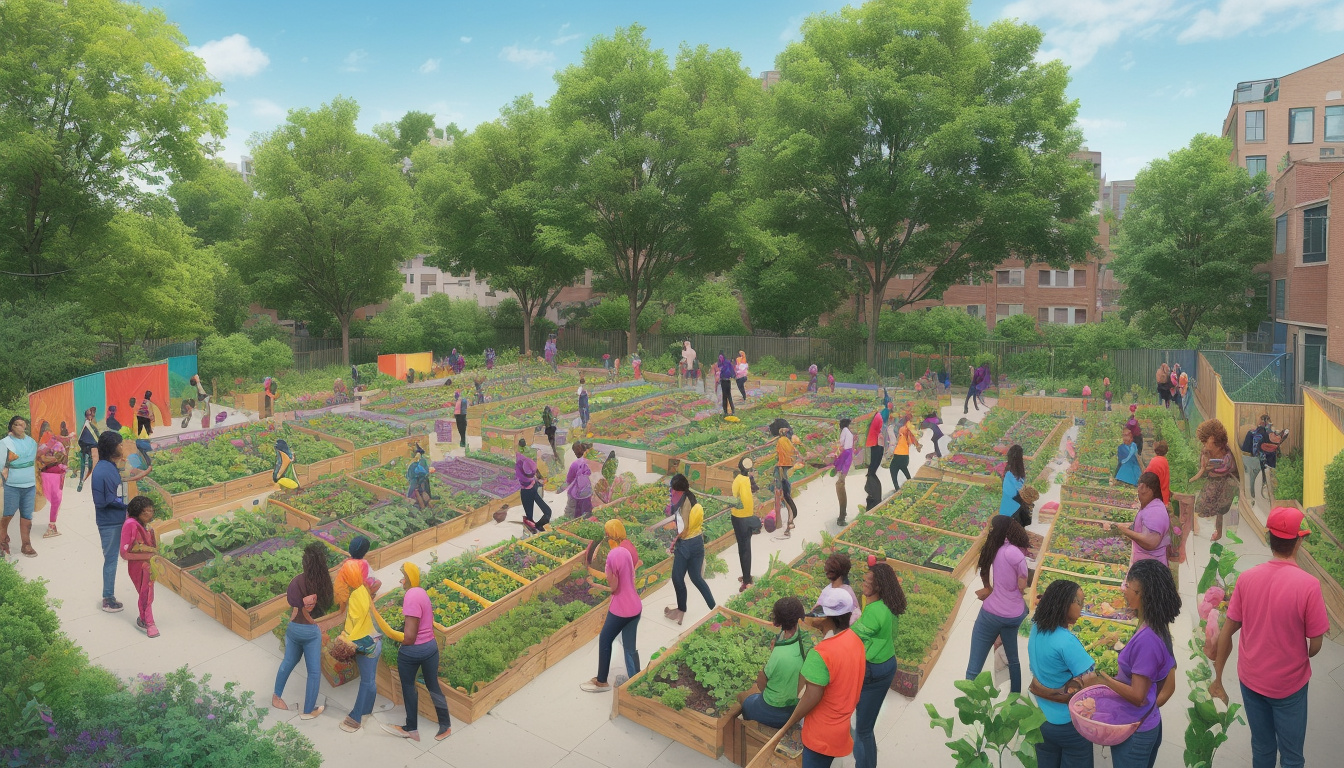Empowering Communities: The Essential Guide to Understanding Food Justice

Have you ever wondered why some communities have easy access to fresh produce while others have to rely on convenience store options? This disparity is part of a larger issue known as food justice. In this guide, we’ll explore what food justice really means, why it’s crucial for communities, and how everyone can get involved in making a difference. Whether you're a health enthusiast looking to promote better nutrition, a farmer striving for more equitable food systems, or just a concerned consumer, understanding food justice is essential. So, let’s dive into the world of food justice and discover how we can all contribute to a fairer food landscape!
Interested in our Digital Magazine APP?

Here's a thought
- Food justice ensures equitable access to nutritious food for all communities.
- Understanding food justice is crucial for addressing systemic inequalities in food systems.
- Key challenges to achieving food justice include economic barriers and discriminatory practices.
- Successful food justice initiatives can serve as models for communities seeking to improve access to food.
- Advocating for food justice involves community engagement and policy change efforts.
What is Food Justice?
Food justice is an essential concept that emphasizes equal access to healthy, high-quality food for all communities, regardless of their socio-economic status. It acknowledges that food is not just a commodity; it's a human right. Food justice advocates seek to eliminate the systematic inequalities in the food system that often leave marginalized communities without access to nutritious options.
This movement encourages a holistic approach where the voices of farmers, consumers, and health enthusiasts coalesce to advocate for sustainable and ethical food practices. By understanding food justice, we can work together to create a more equitable food system that supports both community health and local agriculture, ensuring that everyone has the opportunity to lead a healthy, vibrant life.
The Importance of Food Justice in Communities
Food justice is a crucial aspect that significantly impacts communities, especially when it comes to ensuring access to healthy and nutritious food for everyone. As we navigate through the challenges of modern society, understanding the importance of food justice can foster a more equitable food system.
Essentially, food justice addresses the inequalities in food access and distribution, allowing individuals from all walks of life to enjoy the benefits of fresh, locally-sourced produce. For health enthusiasts, this concept emphasizes the significance of understanding where our food comes from and the benefits of supporting local farmers who practice sustainable agriculture. It's not just about individual health; it's about community health as well. Farmers, on the other hand, play a pivotal role in advancing food justice by providing accessible and affordable food options.
This collective effort nurtures connections between consumers and producers, promoting a healthier lifestyle and a more resilient food system. By advocating for food justice, we can work towards eliminating food deserts and ensuring that everyone, regardless of their socioeconomic status, has access to the nourishment they need.
'Food justice is the right to grow, sell, and eat healthy food, with dignity and fairness for all.' - Tanya Fields
Key Challenges to Achieving Food Justice
Food justice is a critical conversation as we navigate our modern food systems, but several key challenges hinder its achievement. Firstly, socioeconomic disparities dramatically shape access to fresh, nutritious food. Many low-income neighborhoods are plagued by food deserts, where grocery stores are scarce, forcing residents to rely on fast food or processed options.
This situation is compounded by lack of education on nutrition, affecting health outcomes. Secondly, agricultural practices currently favor industrialized farming, often disadvantaging small farmers who practice sustainable methods. These small-scale farmers, who play a pivotal role in promoting food justice, often struggle with regulations, market access, and financial support.
Finally, systemic issues such as racial inequities and environmental degradation exacerbate the fight for food justice. It's essential that we, as consumers, advocates, and health enthusiasts, remain informed about these challenges, support local farmers, and speak up for equitable food systems that prioritize access to healthy food for all.
Interested in our Digital Magazine APP?

Successful Food Justice Initiatives
Food justice is gaining traction as a powerful movement dedicated to ensuring equitable access to healthy and culturally appropriate food for all communities, regardless of socioeconomic status.
Successful food justice initiatives showcase how collaboration between local farmers, health enthusiasts, and community members can lead to transformative change. For instance, urban agriculture programs have flourished in cities, providing fresh produce to underserved neighborhoods while simultaneously offering educational workshops on nutrition and sustainable growing practices.
Moreover, partnerships with local schools have introduced farm-to-table programs, where students not only learn about food systems but also actively participate in growing and preparing meals, thereby fostering a deeper connection to their food sources. These initiatives underscore the importance of collective action in promoting food justice, creating a more sustainable food system that benefits everyone and strengthens community ties.
How to Advocate for Food Justice
Advocating for food justice is an important step that every consumer, health enthusiast, and farmer can take to create a more equitable food system. To start, you can educate yourself about the concept of food justice, which focuses on ensuring that everyone has access to healthy, affordable food regardless of their socioeconomic status.
Attend community meetings, support local farmers' markets, and participate in workshops that discuss the disparities in food access in your area. Partnering with organizations that champion food justice can amplify your voice; consider volunteering or contributing to local food pantries and community gardens.
Additionally, advocate for policies that support sustainable agricultural practices and equitable food distribution by reaching out to your local representatives. Remember, each small action can contribute to the larger movement toward food justice, making a significant impact on our communities and the environment.
Here's something people ask about
What is food justice?
Food justice refers to the fair distribution of food resources and opportunities, ensuring that all communities have access to nutritious, affordable, and culturally appropriate food. It addresses the social, economic, and environmental issues that influence food access.
Why is food justice important in communities?
Food justice is crucial because it empowers marginalized communities to have equitable access to healthy food, reduces food insecurity, promotes local economies, and encourages sustainable food systems that respect the environment.
What are some key challenges to achieving food justice?
Key challenges include systemic inequalities such as poverty, lack of access to transportation, limited availability of fresh foods in certain neighborhoods, and the influence of corporate agriculture on food distribution policies.
Can you provide examples of successful food justice initiatives?
Examples of successful food justice initiatives include community gardens, food co-ops, urban farming projects, and programs that connect local farmers with underserved populations, such as food banks or community-supported agriculture (CSA) programs.
How can individuals advocate for food justice?
Individuals can advocate for food justice by educating themselves and others, volunteering with local food organizations, supporting legislation that promotes equitable food distribution, and participating in community discussions about food systems.
We're striving to bring a range of different topics that relate to the Farming Food & Health sector. If you've got a question, please feel free to contact us.
We publish a quarterly magazine available in IOS, Android and Web reader. Stories and articles curated from amazing people all around the world.






